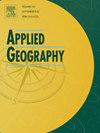Exploring vulnerability amplification in regional health inequality: COVID-19 case study in Czechia
IF 4
2区 地球科学
Q1 GEOGRAPHY
引用次数: 0
Abstract
This paper proposes a novel conceptual framework of vulnerability amplification to examine regional health inequalities. It combines differential vulnerability in health and social amplification of risk, as mechanisms of differential vulnerability are shaped by mechanisms of social amplification and mutually influence the level and dynamics of regional health inequalities. A spatial epidemiology analytical framework is used to examine ecological and spatial interdependencies, as well as the effects of compositional (population structure) and contextual factors (health intervention), alongside the spatiotemporal effects on regional health outcomes. An empirical application of the concept using the example of the COVID-19 pandemic crisis at the micro-regional level in Czechia documents widening regional health disparities during the health crisis, with the most vulnerable regions most affected. In the case of a possible future health crisis, this conceptual and methodological approach can enhance management of impacts through effective, better-targeted preventive measures that account for fundamental regional differences and specificities.
探索地区健康不平等中的脆弱性放大:捷克 COVID-19 案例研究
本文提出了一种新的脆弱性放大概念框架来研究区域卫生不平等。它结合了健康方面的不同脆弱性和风险的社会放大,因为不同脆弱性的机制是由社会放大机制形成的,并相互影响区域卫生不平等的水平和动态。空间流行病学分析框架用于检查生态和空间的相互依赖性,以及组成(人口结构)和背景因素(卫生干预)的影响,以及对区域卫生结果的时空影响。以捷克2019冠状病毒病大流行危机为例,对这一概念在微观区域层面的实证应用表明,在卫生危机期间,区域卫生差距不断扩大,最脆弱的地区受影响最大。在未来可能发生健康危机的情况下,这种概念和方法方法可以通过考虑到根本区域差异和具体情况的有效、更有针对性的预防措施,加强对影响的管理。
本文章由计算机程序翻译,如有差异,请以英文原文为准。
求助全文
约1分钟内获得全文
求助全文
来源期刊

Applied Geography
GEOGRAPHY-
CiteScore
8.00
自引率
2.00%
发文量
134
期刊介绍:
Applied Geography is a journal devoted to the publication of research which utilizes geographic approaches (human, physical, nature-society and GIScience) to resolve human problems that have a spatial dimension. These problems may be related to the assessment, management and allocation of the world physical and/or human resources. The underlying rationale of the journal is that only through a clear understanding of the relevant societal, physical, and coupled natural-humans systems can we resolve such problems. Papers are invited on any theme involving the application of geographical theory and methodology in the resolution of human problems.
 求助内容:
求助内容: 应助结果提醒方式:
应助结果提醒方式:


